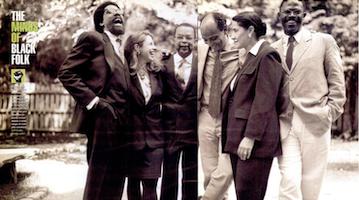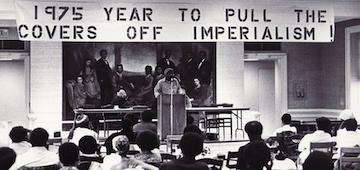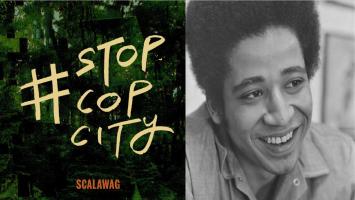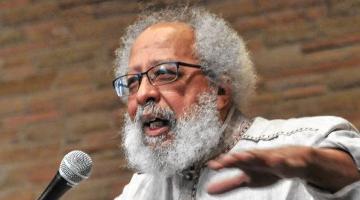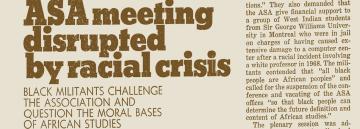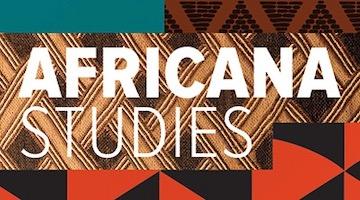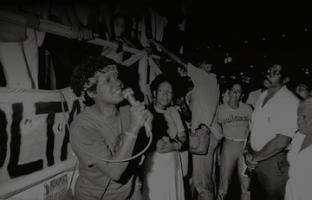In this series, we ask acclaimed authors to answer five questions about their book. This week’s featured author is fahima ife. ife is Assistant Professor of English at Louisiana State University. Their book is Maroon Choreography.
Roberto Sirvent: How can your book help BAR readers understand the current political and social climate?
fahima ife: Maroon Choreography is preoccupied with capitalism, the climates crises, the afterlives of slavery, the lasting social impacts of “the weather” in continuation and deep admiration of Christina Sharpe’s In the Wake and so many other works in Black Studies. At the same time Maroon Choreography performs anticapitalism, performs an ecstatic reverence of the Earth, tries to get beyond the afterlives of slavery by way of a trans*poetics. So at work in the book is sustained disembodied play, a dance of mythic Black sociality inside an Indigenous forest imagined as the Blackqueer afterlives of fugitivity. Although it happens obliquely, Maroon Choreography is also critiquing the modernist and capitalist choreographies of social media. The book is critiquing social media’s simultaneous destruction of the Earth by way of the Internet, its reproduction of a new generation of capitalism, its rapacious preoccupation with Black sociality, its general surveillance of mundane life, and the illusion of community. Throughout Maroon Choreography there’s a serious consideration of the inherent asociality of social media, the paradox at work in those platforms, alongside a desire for socialism. Can something be hyperreal and surreal at the same time? I have no idea, but in terms of our troubled social and political climate Maroon Choreography plays within that question too.
What do you hope activists and community organizers will take away from reading your book?
Maroon Choreography is a performance in black study, so inherent in the book is a desire and practice to reclaim the local, small scale, the necessarily mundane tenderness of being together in person—walking and moving and wheeling together outside, offering shared attention to the earth, talking with each other, listening to each other, tending to each other, crying together, feeling each other, vocalizing desire, holding desire, remembering where we have already been, wanting and collectively trying to figure out how to end up somewhere else, partying inside a rented house, dancing together at midnight, loving and not loving, fucking and friction and rubbing, pleasure for pleasure’s sake, smoking, being real fugitive together, drinking, convening, coming and coming again, black sensuality, preparing a meal together and eating it, sharing a home, laughter, the hours inside the clearing, the hours spent together recursively weeping, the hours spent retracing where we have already been, reclaiming the night, reclaiming the secret—so that mundane life becomes so intentionally and fully integrated in shared activity it stops being mundane, becomes marvelous. Being together in person as to create the possibilities for living in common, for sharing. And in all that active and communal marvel we move beyond the impulse to refer to ourselves as “activists” and “community organizers” or even “artists” and instead try to figure out what it is we want to do together.
We know readers will learn a lot from your book, but what do you hope readers will un-learn? In other words, is there a particular ideology you’re hoping to dismantle?
Lately, I’ve been thinking with Christina Sharpe and Aristotle about form, discipline, absolutes, and our role in the transformation of knowledge production as it happens in the neoliberal university. In her brilliant In The Wake, Sharpe is retracing her steps, considering alternate possibilities as she urgently invokes undisciplinarity, invites us to practice being undisciplined. And we all heard it, if we heard it, her call to release the antiBlack methods of our academic training in reverberation of Audre Lorde. In Metaphysics Aristotle is walking and talking, trying to consider alternate realities, and I’ve been laughing with Aristotle’s question—And again with the things that are perceptible, how will one have cognition of them if one does not have sense? I’ve been drifting with Sharpe and Aristotle wondering if sense can be taught. I’ve been thinking, too, with my grandfather, Lucius, who was smart because he never went to school. Before Lucius died he gave me a koan about common sense and I’ve been thinking with that riddle for the past twenty-seven years. While shaping Maroon Choreography I was unlearning academic discipline (its methods, its forms) while simultaneously cultivating creative discipline and the entire process was so sensual! The book wants to dismantle the ideology that presumes knowledge is reproducible, that assumes practice and theory and theorizing and philosophy and philosophizing happens by way of a template. If it has not happened already, I hope readers are inspired to reclaim their creativity, their sensuality, and unlearn the rigidity of formalism.
Who are the intellectual heroes that inspire your work?
It always begins with my inherited mysticism shared among my maternal grandparents (Lee + Lucius), my mother (Mina Maciel), my aunties, my uncles, my siblings, and my cousins. My teachers and mentors—Maisha Winn, Gloria Ladson-Billings, Kate Vieira, Morris Young, Carl Grant, Alexis De Veaux, Valerie Kinloch, David E. Kirkland, David Stovall, Sonja Lanehart, Damián Baca, Leigh Patel, and Arnetha Ball. Then Black writers of the long 20th century whose works continue to inform my thinking—Gwendolyn Brooks, Langston Hughes, Toni Morrison, Alice Walker, bell hooks, Sonia Sanchez, Amiri Baraka, June Jordan, Octavia E. Butler, Zora Neale Hurston, Toni Cade Bambara, and Édouard Glissant. And a lot of contemporary poets and critics whose works I continue to read: Fred Moten, Saidiya Hartman, Nathaniel Mackey, Taylor Johnson, Simone White, Renee Gladman, Kemi Adeyemi, La Marr Jurelle Bruce, Christina Sharpe, Dionne Brand, M. NourbeSe Philip, Kevin Quashie, Habiba Ibrahim, Alexis Pauline Gumbs, Dawn Lundy Martin, Cameron Awkward-Rich, Solimar Otero, C. Riley Snorton, Keguro Macharia, Marquis Bey, Jennifer Nash, D. Scot Miller, Cole Swensen, Sarah Cervenak, J. Kameron Carter, Alice Notley, Jenny Xie, Anne Carson, Danielle Vogel, Natalie Diaz, Ben Lerner, Rachel Zolf, and many more. Plus musicians and filmmakers and visual artists and performers whose works provide the numinous surround for my practice: Alice Coltrane, Moses Sumney, taisha paggett, Jlin, Arazel Thalez, Terence Nance, Donald Glover, Torkwase Dyson, Dionne Lee, Sky Hopinka, Flying Lotus, Julie Mehretu, Chihei Hatakeyama, Don Cherry, Frank Ocean, Mary Lattimore, Eric Satie, Janicza Bravo, Sigur Rós, Sister Nancy, Mulatu Astatke, Space Afrika, Joni Mitchell, Hiroshi Yoshimura, and Zora Murff. Friends and artists in Louisiana— simóne banks, Jonathan Clark, Kalvin Morris, Shakirah Peterson, Monterica Neil, Brittany Marshall, Ian Lockaby, Karisma Price, Lara Glenum, Laura Mullen, Joshua Wheeler, Penda Smith, and Sokari Ekine. Always, always, mycelium + tree roots!
In what way does your book help us imagine new worlds?
On some level, one of my favorite levels, Maroon Choreography is fantasy. I made fantasy from years of sustained black study! I’m so fortunate to have so many friends to dream with, so I really should say, we made fantasy, and my name is just on the cover of the book. To write Maroon Choreography I had to practice staging impossible enchantments, to perform a series of refusals, to perform within and without the page, to practice using our other sense. The book’s portal is happening inside an astral forest among a series of astral entities and there are many openings and dimensions inside that forest. It’s simultaneously elevated and bottom play. It’s pretending and not pretending to be scholarly. It’s more and less than scholarly. Somewhere in that willful playfulness is in invitation, a call for others to play, too, with poetics. I hope Maroon Choreography becomes a playmate for anyone who wants to become re-enchanted by Black Studies again (in reverberation of what Rinaldo Walcott said at Black Portraitures VI). It’s a collective lucid dream summoning the surreal, the astral, and the fantastic among us. I think I’m dancing around this question—just by being in the world, Maroon Choreography helps us imagine new worlds.
Roberto Sirvent is editor of the Black Agenda Report Book Forum.

